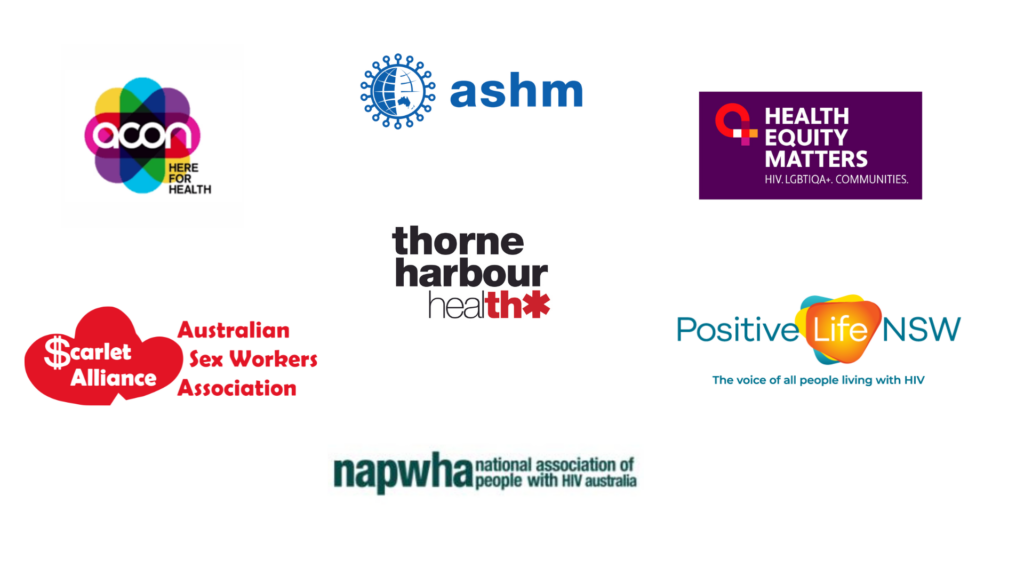Download the PDF version of this statement.
Download the full summary of the roundtable.
The published version of this consensus statement available at http://doi.org/10.5694/mja2.52258. Please reference the published version whenever making reference to this statement in published papers.
Introduction
Doxy-PEP involves taking 200mg of doxycycline up to 72 hours after a sexual act to reduce the risk of bacterial sexually transmitted infections (STI). Among gay, bisexual, and other men who have sex with men (GBMSM), clinical trials of Doxy-PEP have shown significant reductions in syphilis (by 70–80%) and chlamydia (by 70–90%), and to a lesser degree, gonorrhoea (ineffective in some trials, or 50–55% reduction in other trials, due to varying levels of tetracycline resistance in gonococcal isolates in different populations).
However, uncertainty remains regarding unintended outcomes from Doxy-PEP. These may include harms to individuals taking Doxy-PEP, such as disruptions to their microbiome and increased antimicrobial resistance (AMR) in STIs and other organisms, and harms to the community through increased population-level AMR. As such, individuals who might benefit from Doxy-PEP need to be supported to weigh up the potential benefits versus the potential harms from using Doxy-PEP, while considering whether this STI prevention strategy is suitable for them in their current context, in addition to conventional STI prevention strategies such as condoms.
Evidence for the effectiveness of Doxy-PEP, and considerations around potential risks of Doxy-PEP, are described in detail in ASHM’s previously published interim position statement.[1]
Process for development of this consensus statement
On 17 March 2023, ASHM convened a national roundtable discussion on the use of Doxy-PEP in Australia, as listed in the appendix. The stakeholders included community representatives, clinicians, researchers, and experts in infectious diseases, public health, epidemiology, microbiology, and antimicrobial stewardship, to review data, exchange expertise, and develop guidance. ASHM has developed this consensus statement in consultation with the stakeholders present at the roundtable. There was broad consensus in the group on the recommendations listed below, with the notable exception that a minority of stakeholders expressed that Doxy-PEP should be considered only to prevent syphilis among GBMSM, rather than primarily be considered for this purpose. Additionally, some stakeholders expressed concern that the impact of Doxy-PEP on gonococcal AMR, and AMR in other organisms, has not yet been assessed sufficiently.
Considerations that inform these recommendations
While Doxy-PEP is an effective strategy to prevent bacterial STIs such as chlamydia, gonorrhoea and syphilis among GBMSM, the risk/benefit calculation is most favourable for the prevention of syphilis. Of the bacterial STIs, syphilis carries the greatest morbidity among GBMSM, especially among GBMSM living with HIV. In contrast, the majority of chlamydia and gonorrhoea infections among GBMSM are asymptomatic, and they rarely cause complications. In addition, Doxy-PEP is less likely to be effective to prevent gonorrhoea in the Australian context, due to high rates of tetracycline resistance in Australian gonococcal isolates. Given these considerations, Doxy-PEP should be considered primarily to prevent syphilis among GBMSM. Importantly, for these same reasons, a minority of stakeholders held the view that Doxy-PEP should be considered only for the prevention of syphilis among GBMSM (as opposed to “primarily”).
Known risk factors for STIs include sexual behavioural history (e.g., sex without condoms, casual sexual partners, sexualised drug use), current use of HIV PrEP, and HIV-positive status. A recent analysis of clinic data from Boston (USA) explored the efficiency of different Doxy-PEP prescribing strategies by comparing the number needed to treat (NNT) using Doxy-PEP to prevent a bacterial STI case. This study found that prescribing Doxy-PEP for 12 months to individuals with one or more recent STI diagnoses (within the previous 12 months) was an efficient strategy for reducing the amount of Doxy-PEP prescribed, with NNTs ranging from 1.3–1.5 to prevent one bacterial STI case over 12 months. As discussed above, the prevention of syphilis deserves particular attention, and the same analysis found that prescribing Doxy-PEP to individuals currently diagnosed with syphilis resulted in the most efficient strategy for preventing subsequent syphilis diagnoses (NNT=9.5 if Doxy-PEP is used for 12 months).[2]
STIs have different implications for GBMSM with cisgender female sexual partners or other sexual partners with a uterus, due to risk of transmission to these partners. In women and other people with a uterus, chlamydia and gonorrhoea can cause pelvic inflammatory disease and associated complications (e.g., infertility and ectopic pregnancy). Maternal syphilis can result in several complications, including miscarriage, stillbirth, neonatal death and congenital syphilis. Because of these additional risks, a lower threshold may be warranted for prescribing Doxy-PEP to GBMSM with cisgender female sexual partners or other sexual partners with a uterus. However, it should be noted that Doxy-PEP has not been studied in terms of prevention benefit for sexual partners.
These recommendations are intended for GBMSM and do not apply to other communities or populations. Importantly, Doxy-PEP was found to be ineffective in a study of cisgender women in Kenya, although further analysis has suggested that this was the result of low adherence to Doxy-PEP.[3] Guidance for other communities or populations will need to be developed as evidence emerges.
Recommendations for community and clinicians
- Doxy-PEP should be considered primarily for the prevention of syphilis in GBMSM who are at risk of this STI, although for some individuals the reduction in chlamydia, and the lesser reduction of gonorrhoea might be important. Some stakeholders held the view that Doxy-PEP should be considered only for the prevention of syphilis in GBMSM, for the reasons listed above.
- While evidence for appropriate suitability criteria for commencing Doxy-PEP is limited, the following might be appropriate for considering doxy-PEP until further data emerges:
- GBMSM with a recent syphilis diagnosis (e.g., within the previous six or twelve months); or
- GBMSM with two or more recent other (i.e., not syphilis) bacterial STI diagnoses (e.g., within the previous six or twelve months); or
- GBMSM who identify an upcoming period of heightened STI risk, for example, attendance at a sex event, or holiday plans that likely involve sexual activity with multiple casual sexual partners; or
- GBMSM with concurrent male and cisgender female sexual partners or other sexual partners with a uterus, recognising the additional health risks posed by chlamydia, gonorrhoea and syphilis for people with a uterus.
- GBMSM who present for HIV PEP can also consider Doxy-PEP, although the indications for HIV PEP do not necessarily indicate a need for Doxy-PEP.
- Given that STI risk is often not static, it is recommended to use Doxy-PEP for a pre-defined period, e.g., 3–6 months, followed by review of the need for ongoing use.
- Doxy-PEP users should be assisted to maximise the benefits of Doxy-PEP while minimising overall antibiotic use. For example, if a Doxy-PEP user tends to have multiple sexual partners during weekends but few during the week, then a single Monday morning dose of 200mg Doxy-PEP should adequately cover their STI risk, rather than multiple doses over the weekend.
- In general, it is not recommended to use daily doxycycline as pre-exposure prophylaxis (Doxy-PrEP, 100mg daily), as this often results in greater antibiotic consumption than Doxy-PEP, and fewer data support the use of Doxy-PrEP. However, for some people, Doxy-PrEP might be appropriate during periods of heightened (daily) sexual activity that places them at risk of STIs.
- Other antibiotics (e.g., azithromycin) should not be used instead of doxycycline for STI prevention.
- STI screening: Doxy-PEP users should continue to undergo STI screening in line with STI testing guidelines for GBMSM, as the ideal STI screening interval for people using Doxy-PEP has not yet been determined. Current guidelines recommend three-monthly screening for chlamydia, gonorrhoea, and syphilis for this population, but this recommendation might change. Additionally, Doxy-PEP users should be encouraged to attend for STI testing whenever they have symptoms.
- Culture samples must be collected for all gonorrhoea diagnoses prior to administration of antibiotics, to enable AMR surveillance for this organism.
- It is recommended to discuss personal and population-level AMR risks with Doxy-PEP users. Resources should be made available to assist clinicians to raise AMR issues during these conversations in a manner that is appropriate and sensitive to the patient’s needs.
- HIV risk must be assessed and addressed during Doxy-PEP use. GBMSM who are HIV-negative must be supported to access effective HIV-prevention strategies such as HIV PrEP, and GBMSM living with HIV who are not accessing HIV care must be supported to do so.
Recommendations for research, guidelines, and policy
- Formal clinical guidelines need to be developed as more evidence emerges. Guidelines may include suitability criteria, scenarios for prescribing, dosing recommendations, and background information on AMR.
- Education and support materials should be co-designed by clinicians, researchers, and community to ensure that information is consistent across resources, understanding that GBMSM are likely to be a source of Doxy-PEP information for clinicians, and vice versa.
- Further research is needed to understand community members’ and other stakeholders’ views of Doxy-PEP, including priority populations such as GBMSM, sex workers, and Aboriginal and Torres Strait Islander People.
- Doxy-PEP education should be incorporated into existing STI resources, including the Australian STI Management Guidelines, decision-making tools, and STI-related training courses, such as HIV PrEP courses.
- Clinicians need clear guidance on whether and how to monitor for the emergence of AMR, both in bacterial STIs and bystander organisms.
- Molecular tests to monitor AMR should be developed, which could be deployed as reflex tests on all samples positive for Chlamydia trachomatis and Neisseria gonorrhoeae (and swabs positive for Treponema pallidum PCR), to comprehensively monitor for the emergence of AMR in STIs and other organisms.
- Pathology and public health bodies should be appropriately funded to monitor AMR.
- Clinical and community-controlled HIV organisations should be appropriately funded to develop and maintain up-to-date clinical and other educational resources on Doxy-PEP.
- Concerns about AMR are broader than Doxy-PEP, and warrant a broad review of STI management in Australia. This review should include revision of optimal STI screening intervals, as frequent STI screening drives up antibiotic consumption, and antibiotic prescribing practices for both index patients and their sexual partners.
References
1. Cornelisse, V.J., et al., Interim position statement on doxycycline post-exposure prophylaxis (Doxy-PEP) for the prevention of bacterial sexually transmissible infections in Australia and Aotearoa New Zealand – the Australasian Society for HIV, Viral Hepatitis and Sexual Health Medicine (ASHM). Sex Health, 2023. 20(2): p. 99-104.
2. Traeger, M.W., et al., Potential impact of doxycycline post-exposure prophylaxis prescribing strategies on incidence of bacterial sexually transmitted infections. Clin Infect Dis, 2023.
3. Stewart, J., et al., Adherence to Doxycycline PostExposure Prophylaxis for STI Prevention among Cisgender Women, in STI & HIV World Congress. 2023: Chicago.
The consensus process was led by the co-authors of the statement, Vincent Cornelisse, Benjamin Riley and Nicholas Medland.
Roundtable participants and signatories to the consensus statement
Vincent Cornelisse
Benjamin Riley
Nicholas Medland
Alexis Apostolellis
Mish Pony
Darren Russell
Angela Dawson
Fabian Kong
Christopher Fairley
Catriona Bradshaw
Mo Hammoud
Martin Holt
Eric Chow
Judith Dean
Brent Allan
David Lewis
Edwina Wright
Arthur Wong
Basil Donovan
Mark Stoove
Michael Traeger
Catriona Ooi
Bridget Haire
James MacGibbon
Fabiola Martin
Yasmin Mowat
Cherie Bennett
Riley McGoldrick
James Holland
Nathan Ryder
Brent Mackie
Matthew Vaughan
Daniel McCarthy
David Whiley
Alexandra Lipa
Charlotte Bell
Jason Ong
Rebecca Guy
Endorsing Organisations


